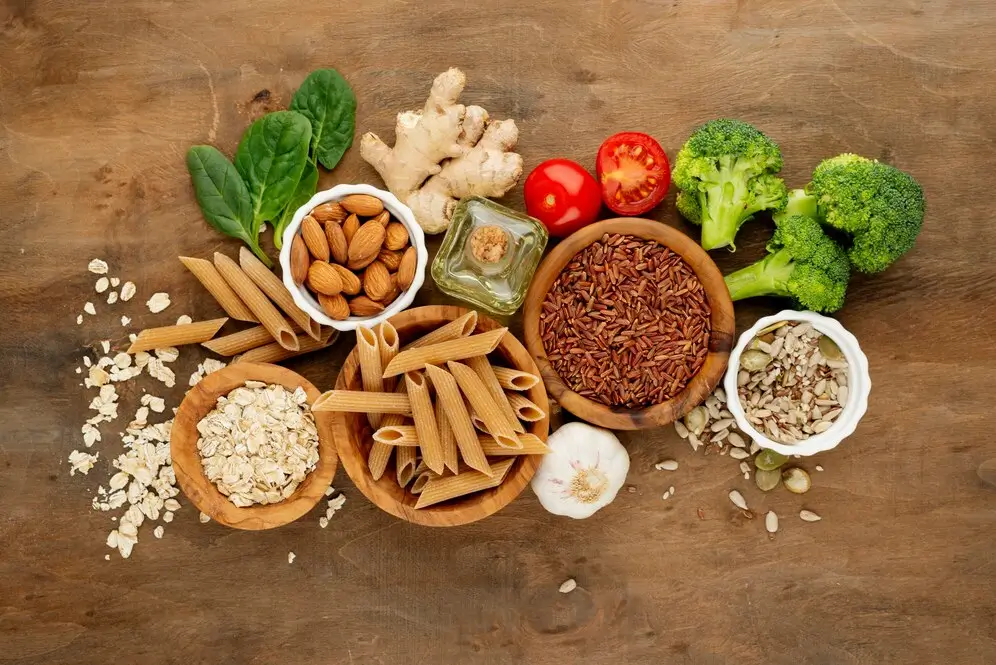Unlocking The Benefits Of Dietary Fiber For Health:
There is a commonly neglected factor in nutrition that greatly contributes to good health. Unabsorbable components of plant-based foods are more important elements in our diet than just aid in digestion. The article discusses all the complex needs of the body and explains the Benefits of Dietary Fiber for Health
Table of Contents
Understanding Dietary Fiber
Roughage can also be referred to as dietary fiber which comprises inedible portion of plant based products. They mainly come from fruits, vegetables, whole grains, beans, nuts and seeds. Fiber can be categorized into two main types: soluble and insoluble.
- Soluble Fiber: It is soluble in water and forms a mucilage mass. Examples of soluble fiber include oats, barley, legumes, fruits and certain vegetables. It is known as a product that lowers the cholesterol levels and assists in controlling the sugar level in blood.
- Insoluble Fiber: Insoluble fiber does not disintegrate in water but serves as roughage for the stool, helping it pass down the colon regularly. The best sources of insoluble fiber include whole grains, vegetables and even the skins of certain fruits.
The Role of Dietary Fiber in Health
One of the common advantages that are associated with dietary fiber is its contribution it offers towards digestive health. Increased intake of fiber will make the stool bulky, soften it, and prevent constipation. Fiber helps in prevention of bowel diseases such as hemorrhoids and diverticulosis.
1. Weight Management:
High fiber intake is usually associated with low caloric foods that are harder to consume resulting in greater sense of satiety. This may aid in lessening calorie consumption and maintenance of weight loss.
Furthermore, soluble type of fiber slows the rate at which nutrients are absorbed in the system and this reduces food craving hence assisting in the process of weight management.
2. Heart Health:
The dietary fiber has a great influence on one’s heart health. Soluble fiber minimizes on cholesterol particles by eliminating them out of the body as they stick together.
This goes on to minimize the chances of heart diseases and stroke. Additionally, a diet rich in fiber may reduce blood pressure and promote an improved heart condition.
3. Blood Sugar Control:
This makes dietary fiber a helpful friend to people suffering from diabetes or diabetic patients who are prone to contract the illness.
Soluble fiber including that from oats and legumes helps to lower surges in blood sugars by retarding their absorption rate. It is important in controlling diabetes, and preventing complications.
4. Gut Health and Microbiome:
Gut microbiome refers to trillions of microorganisms that reside in the human gut. Beneficial bacteria use dietary fiber also referred to as roughage as fuel for that, hence promoting their growth and variety.
For instance, it has several health benefits that contribute to strengthened immunity, decreased inflammation, and even positive mental health.
5. Cancer Prevention:
There are also others that seem to indicate that a high-fiber diet could contribute to prevention of particular cancers, including colorectal cancer.
Fiber provides an environment for good bacteria and helps in removing toxic substances which are called carcinogens. oil refining business essay Although further studies are required it is encouraging that there is a strong correlation between fiber intake and reducing a person’s risk of developing cancer.
6. Skin Health:
The intestinal benefits of dietary fiber are known, and there are external advantages as well. Drinking more water and consuming an adequate amount of fiber could help to flush out toxins and waste from the body thus minimizing chances for skin problems such as acne.
Incorporating More Fiber Into Your Diet
Now that we understand the importance of dietary fiber in promoting health, it’s essential to consider how to incorporate more fiber into your diet:
- Choose Whole Grains: Take more of wholesome grains such as whole wheat, brown rice, quinoa, and rolls.
- Eat Plenty of Fruits and Vegetables: Try to eat as many different colored fruits and vegetables as possible to ensure that you get enough fiber in your dietary plan.
- Include Legumes: Add them to soups, salads, and stews made of beans, lentil, and chick peas – rich in fiber.
- Snack on Nuts and Seeds: Some of the excellent nutritive snacks include almonds, chia seeds, and flaxseeds which are high on fiber.
- Read Food Labels: As much as you can, select high-fiber labelled products when next available.
- Gradual Increases: To be on the safe side, do not introduce too much fiber in your diet at once as this may cause digestive upsets.
Conclusion
Unsung hero in the realm of nutrition, dietary fiber. Digestive function is but one of its numerous benefits towards complete body fitness.
Eating more fiber rich foods have so many benefits such as for digestive health, weight management, good heart health to mention but a few. Therefore, if you want improved health, do not underrate the role and the Benefits of Dietary Fiber for Health.
